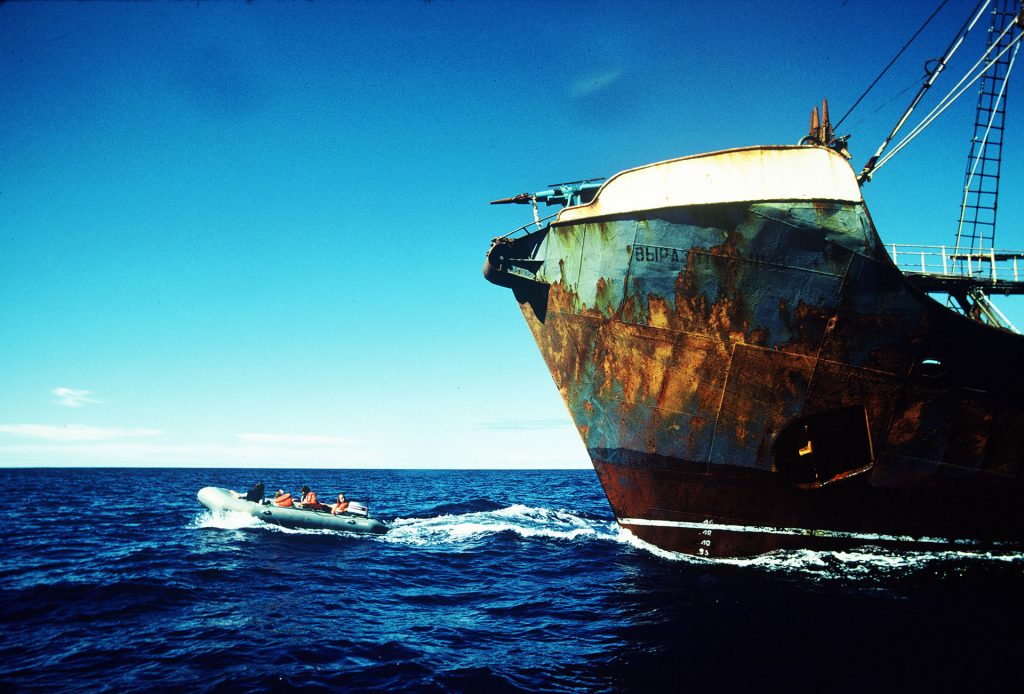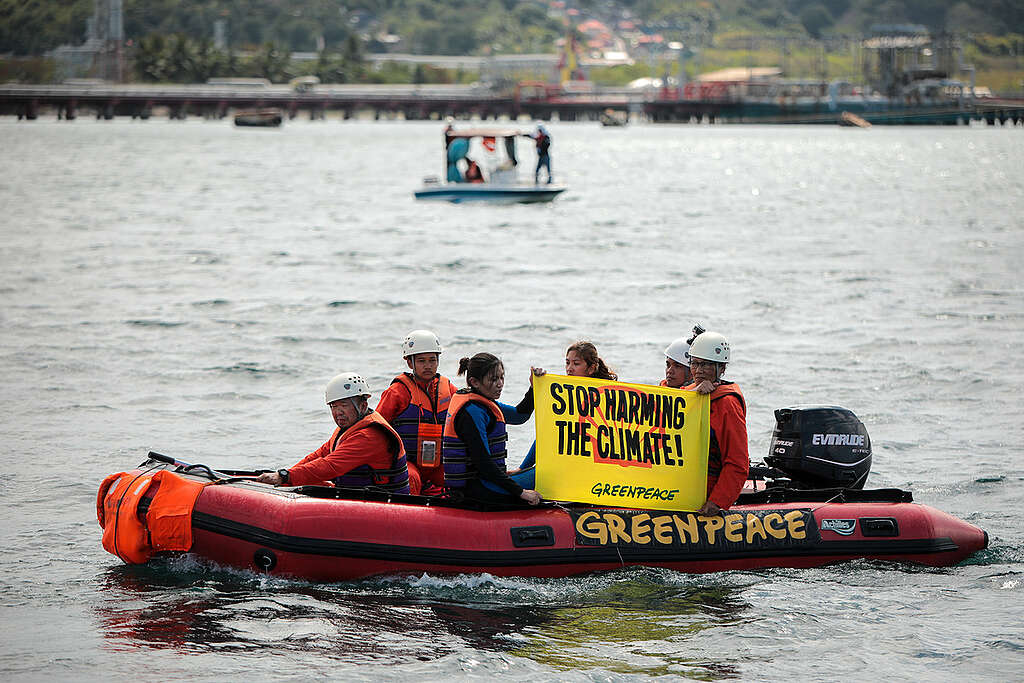Breaking the Mould
The strategic litigation team of our Legal Unit contributed to the Edward Elgar Research Handbook on Climate Change Litigation (2024) with a chapter about strategic litigation titled “Breaking the mould in the strategic design and implementation of climate litigation”

Breaking the mould in the strategic design and implementation of climate litigation
Just as the image of a harpoon flying over an activist in a raft towards a whale created history; a meritorious legal action can serve a similar purpose.
We made a conscious choice to embark on a journey to understand, learn and streamline in our practice a movement lawyering approach. We are a work in progress, and this is a snapshot of where we are at this point in time. We invite academics and practitioners to re-shape their strategic thinking and embark on their own journey in breaking the mould.
– Greenpeace International Legal Unit’s strategic litigation team
Using the law with “humility, love and courage”
This book chapter explores the heart of the process of designing climate litigation by digging into the questions of who defines what is strategic and how?
It explores breaking from the predominant model of top-down litigation, in order to co-create strategies that are truly rooted in people power from inception. The climate emergency is at its core a question of environmental and social justice, human rights and equity — so the process of litigating strategically should apply an intersectional approach and address the different layers of oppressive power; it should be defined and led by the affected communities and movements seeking to achieve long-lasting systemic change beyond the courtroom.
We distil practical guidance, grounded on a theoretical framework, by exploring lessons from successes and failing forward, based on the experiences of legal practitioners, campaigners, communities and movements on the ground. We discuss the imperative of co-creating strategic litigation with affected communities at the centre, the opportunities, the process and key considerations of the design stage, the risks and finally, the lessons for the future generation of climate justice cases.
Stories Breaking the Mould
Around the world communities are using the law to change their stories.
The Movement Lawyering at Greenpeace Project
“Breaking the mould in the strategic design and implementation of climate litigation” is part of the Movement Lawyering at Greenpeace Project.
Our vision is to help achieve systemic change by building truly people-powered projects where the legal strategies are crafted and driven together with the campaign, lawyers and local communities with the ultimate goal of co-powering these communities, exchanging knowledge and skills, building together our collective capacity, know-how and power.
We support organised communities in using strategic litigation as one of many tools to lead their own fight and enhance their power and capacity to take charge of their own destiny.
Contact Us
Are you a law student, professor, or legal practitioner interested in learning more about Greenpeace’s strategic litigation work? We’ll be offering periodic webinars, please drop us a line!
Cases Breaking the Mould
Different countries, different legal avenues, different communities… all using the law to hold those responsible for the climate and biodiversity loss crises accountable.
Four Individuals & KlimaSeniorinnen Schweiz v Switzerland
In November 2020, 4 individuals and KlimaSeniorinnen Schweiz, supported by Greenpeace Switzerland, brought a climate change case against the Swiss government at the European Court of Human Rights[1], the regional body on human rights. After an unsuccessful journey in national courts, this case has not only been accepted by the European Court of Human Rights[2], but has been granted priority and relinquished to the Grand Chamber of the Court–a rare procedure reserved for cases that raise critical questions for the Court. A hearing was held on 29 March 2023[3]. Following this case another climate case was heard the same day in the Grand Chamber.[4]
The applicants argue that climate-induced heatwaves violate their rights to life and private and family life due to Switzerland’s failure to reduce greenhouse gas emissions.
This case highlights how ordinary people are using the power of strategic litigation to hold their governments accountable for their lack of action against climate change.[5] A judgement from the Court recognising the nexus between climate change and human rights would help strengthen the climate change cases before domestic courts in Europe and worldwide, giving legal force to the demand for GHG emissions reduction to keep global warming below 1.5°C.
Find out more about the case at https://en.klimaseniorinnen.ch.
[1] Verein KlimaSeniorinnen al. v. DETEC (Application no. 53600/20)
[2] ECtHR, Verein Klimaseniorinnen Schweiz and Others v. Switzerland, no. 53600/20, Communicated Case, 17 March 2021
[3] Hearing webcast
[4] ECtHR, Communicated Case, and Carême v France, 7198/21
[5] See also Duarte Agostinho and others v Portugal and 32 other Member States Case (no. 39371/90), which was communicated to be heard at the Grand Chamber the same day with Klimaseniorinnen and Careme Cases, but later on it has been rescheduled to 27 September 2023.
Typhoon survivors, Greenpeace Southeast Asia, Philippines Rural Reconstruction Movement, Sentro Philippine Alliance Of Human Rights Advocates, Philippine Human Rights Information Center, Mother Earth Foundation, Ecowaste Coalition, 350.Org East Asia, Asian Peoples’ Movement On Debt & Development, Alliance Of Youth Organizations, Students-Bicol, Philippine Movement For Climate Justice, Nuclear Free Bataan Movement, Sentro Ng Mga Nagkakaisa At Progresibong Manggagawa, Dakila, Nagkakaisang Ugnayan Ng Mga Magsasaka At Manggagawa Sa Niyugan, v ‘Carbon Majors’: (Philippines Human Rights Petition)[6]
In 2013, the Philippines was ravaged by one of the most powerful tropical cyclones ever recorded. This cyclone claimed the lives of thousands and affected millions of others. Climate change is making tropical storms stronger and more devastating.
As a result of this devastating typhoon, the Commission on Human Rights of the Philippines (CHR) opened the world’s first inquiry on the responsibility of major coal, oil, gas, and cement producers for human rights violations resulting from climate change. These corporations known as the Carbon Majors, include 47 investor-owned fossil fuel producers, such as ExxonMobil, Shell, BP, Chevron, and Total, as well as cement companies like Holcim, Cemex and Lafarge. Cumulatively, they are responsible for two-thirds of global C02 emissions since the beginning of the industrial revolution.
The final report of the CHR was released in May 2022. It undertakes a comprehensive and systematic analysis of climate science; the human rights dimensions of climate change; the severe and mounting impacts of climate change on the human rights of Filipinos; the contribution of the Carbon Majors’ products and operations to climate change and its resulting harms; and the overwhelming evidence that the Carbon Majors companies and the fossil fuel industry have been on notice of climate risks from their products since at least 1965, but misled investors, regulators, and the public about climate risks for decades. The CHR also analyzes the evidence against global human rights standards applicable to States and to business entities in the Philippines and worldwide. A key finding is that all acts to obfuscate climate science and delay, derail, or obstruct the global energy transition may be a basis for liability.
This Commission is significant because it is the first time that a human rights body has asserted its authority to investigate multinational fossil fuel companies. The investigation presents one of the world’s first legal findings of corporate responsibility for climate change and will likely trigger other investigations and judicial actions in the Philippines and other areas. Find out more about the petition at http://chr.gov.ph/nicc-2/.
An overview of the other climate cases supported or brought by the independent national and regional Greenpeace organisations.
[6] Commission on Human Rights of the Philippines. Petition, September 22, 2015. Case No. CHR-NI-2016-0001.
Campaigns Breaking the Mould
Greenpeace campaigns working alongside communities using legal advocacy and the law for a greener future.
Climate Justice & Liability
People around the world are already experiencing the impacts of climate change every day, especially in those communities that have contributed the least to the crisis. Everyone has the right to a safe and healthy environment, but this right is under threat from climate change. A growing number of communities are taking legal action to secure their human rights and hold governments and fossil fuel companies accountable.
Climate Justice & Liability is a campaign in which more than fifteen national regional Greenpeace organisations participate. Its motto is: People have rights. States have duties. Companies have obligations.
The campaign works with communities to hold fossil fuel corporations liable for these actions through new, inspiring and replicable legal tactics to push for much-needed regulations on the issue and to make polluters pay for the impacts of their business and misinformation practices. It demands that governments work harder on ambitious climate and energy laws and policies, while significantly reducing dependence on fossil fuels. Communities made vulnerable by climate change can create a real environmental, political and social transformation using strategic litigation to demand a better future.
As stated in our chapter, Greenpeace’s Climate Justice and Liability campaign established criteria to keep the commitment to building the power of communities at the heart of the work:
- Identify efforts that will shift power dynamics.
- Ensure all efforts build the power of communities and mobilise people’s power.
- Select efforts that will create systemic change.
- Identify efforts that will change mindsets.
Related Articles

Toppling modern-day Goliaths in the fight against climate polluters
In climate litigation in the Philippines against 47 large corporations, a Greenpeace legal team showed that big polluters can be held morally and legally responsible for climate change.
